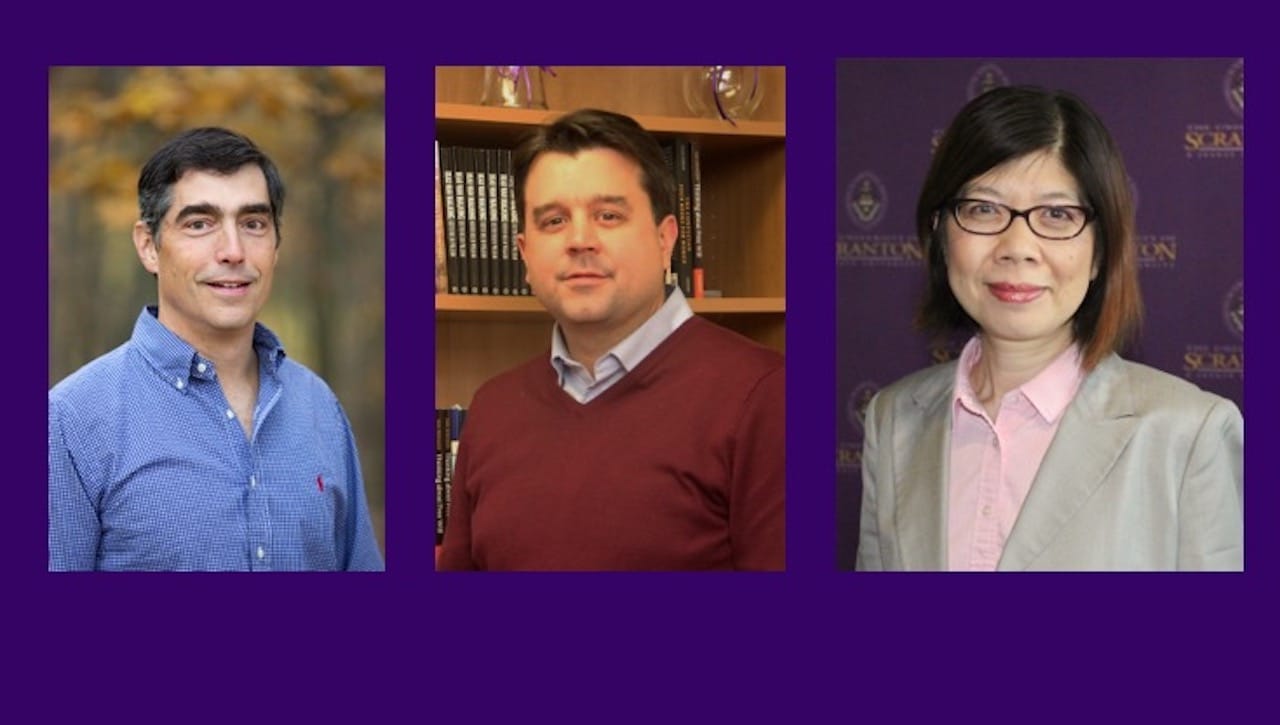Schemel Forum Courses Set for Spring

This spring, The University of Scranton’s Schemel Forum will hold another semester’s worth of stimulating programming courtesy of its ever-diverse collection of courses, luncheons and collaborative programs geared around contemporary cultural and political issues.
There will be three courses this spring, with the first one beginning Thursday, Feb. 2. Taught by University faculty members, the courses are presented in six weekly sessions from 6 to 7:15 p.m. in the Weinberg Memorial Library.
The courses are free for University students, faculty, staff and Schemel Forum members, and $75 per individual and $125 per couple for non-members.
Joseph Kraus, Ph.D., professor in the University’s Department of English and Theatre, will present “Down These Mean Streets: An Ethics of Hardboiled, Noir Fiction,” on Monday evenings Feb. 6, 13, 20 and 27, and March 6 and 13.
During the course, Dr. Kraus and the class will examine the roots of noir fiction, beginning with its roots in the 1920s and moving all the way up to today’s contemporary practitioners of the form. The class will discuss a selection of stories and novels, as well as some of the classic films they inspired.
Most people hear the word “noir” and think of Humphrey Bogart in a fedora, Dr. Kraus said. That’s true -- but only partly, he stressed.
“For me, noir begins with the crisis of faith that (Ernest) Hemingway and others explored in the 1920s as Modernism developed in literature. Hemingway’s stories show us characters who have lost their faith in something larger – whether religion or some cultural system – and then he shows how they develop ‘codes’ for moving forward in their lives,” Dr. Kraus said. “The first full-blown successful hardboiled/noir writers, Dashiell Hammett and Raymond Chandler, move forward with that idea of characters who employ codes of conduct in contexts where faith has collapsed. Chandler gives us detectives who aspire to be modern-day knights but settle for being emotionally insulated men doing what they can to protect flawed clients. Hammett ironizes the whole situation, giving us characters who seem cut-throat but act from clear and sustained motives.”
“Put another way, I see noir as a form of ‘applied ethics,’” Dr. Kraus added. “It asks the question of how we should carry ourselves in a world where – as Nietzsche suggested and Hemingway echoed – we’ve lost the moral clarity of an inherited faith.”
Ann A. Pang-White, Ph.D., professor in the University’s Department of Philosophy and director of the Asian Studies program, will present “Philosophy East and West” Wednesdays March 1, 8, 15, 22 and 29 and April 5.
Why teach philosophy comparatively and cross-culturally? What are the benefits of thinking outside the box? Those are some of the questions Dr. Pang-White will explore in the class, reviewing the works of Western thinkers like Plato, Aristotle, Aquinas and Kant and then thematically compare them to Confucianism, Daoism and Buddhism on topics of self-and-other, virtue, government, gender and ecology.
The purpose of this comparative approach, according to Dr. Pang-White, is to broaden people’s mental horizons by considering alternative conceptual frameworks that can serve as useful resources for treatment of contemporary social, political and environmental problems.
“Oftentimes intercultural conflict arises from a lack of understanding of other cultures,” Dr. Pang-White said. “Because of my international heritage and background in philosophy, I thought it would be a great use of my knowledge and interest to bring Western philosophy into conversation with non-Western philosophy on key issues as a step toward peace-making, using a method that questions rigid binary thinking about self and others. I am excited to teach this course and hope that participants will find the class experience enjoyable and thought-provoking.”
Matthew Meyer, Ph.D., professor in the University’s Department of Philosophy, will present “The Anatomy of Contemporary Conservatism in the U.S.” Thursdays Feb. 2, 9, 16 and 23 and March 2 and 9.
The course, Meyer said, will explore “the different strands of conservatism that have emerged in recent years, from George Will’s defense of classic liberalism to Yoram Hazony’s turn to nationalism, and ask to what extent, if at all, these different strands are compatible with each other.”
This semester will be the final one for longtime Schemel Forum Director Sondra Myers, who is retiring.
“It has been a privilege for me to serve you with issues and ideas through all these years and get to know you all,” Myers said in remarks to the Schemel Forum community. “We’ll always be friends.”
To register for the courses, or for more information on the Schemel Forum, contact Brooke Leonard at 570-941-4740 or brooke.leonard@scranton.edu. Or, to pay online, visit: www.scranton.edu/schemelforum.
Additional Schemel Forum events can be found on the Schemel Forum’s webpage.






